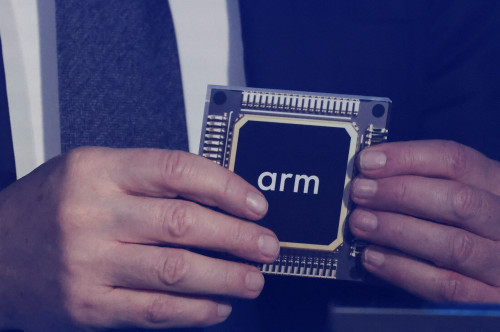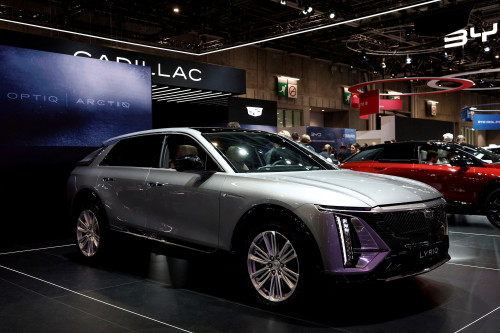By Arsheeya Bajwa and Stephen Nellis
(Reuters) – Arm Holdings forecast first-quarter sales and profit below Wall Street estimates on Wednesday, as global trade tensions threaten revenue from its chip architecture used across the smartphone and data center industries.
While Arm’s fourth-quarter revenue slightly beat analysts’ estimates, companies across the board have provided cautious quarterly forecasts as sweeping global tariffs announced by U.S. President Donald Trump and tighter U.S. curbs on the export of advanced semiconductors to key chip market China have clouded the outlook for semiconductor firms.
Arm shares fell more than 8% in after-hours trading after the forecast.
Unlike for its previous fiscal year, Arm did not give annual guidance for its fiscal 2026, which began in April. Arm CEO Rene Haas said that the company’s increasing share of revenue from per-chip royalty payments, which are in turn tied to sales of devices such as smartphones and laptops, has made its business harder to predict for the full year.
“We are really tied to end-market demand,” Haas told Reuters in an interview, which makes it a “little hard to forecast with the macro of what’s going on, on an annual basis.”
Arm’s chip technology powers nearly every smartphone in the world, and the UK-based company has attempted to make inroads in data centers and other markets.
The company forecast first-quarter revenue of $1.00 billion to $1.10 billion, with a midpoint below analysts’ average estimate of $1.10 billion.
Haas told Reuters the below-expectations guidance is due to a large licensing deal that may not close during the fiscal first quarter. Royalty revenue growth will be between 25% and 30% in the fiscal first quarter, higher than in the fiscal fourth quarter, he noted.
“Why are we guiding slightly below consensus – it’s really down to licensing,” Haas said. “We just want to be prudent relative to some large deals that we have visibility on.”
Haas said tariffs so far have had little impact on Arm’s business.
“We don’t really know what that’s going to look like today. It’s not a big impact, because 10% to 15% of our shipments end up in the U.S.,” Haas said.
Apple, a major customer, flagged the addition of $900 million to costs this quarter from supply chain shifts to minimize the impact of the ongoing trade war.
Shifting trade policies are likely to hurt consumer demand, bringing on a possible decline in the smartphone market this year, according to research firm Counterpoint.
While smartphone shipments rose only slightly, Arm’s royalties from the segment jumped 30% in the fiscal fourth quarter as higher-end chips use its latest technology that generates larger royalty payments, Haas said.
“We’ve seen a big delta between our royalties on smartphones and unit growth.”
However, if consumers become spooked this year and gravitate toward entry-level smartphones, those devices likely will not use Arm’s latest offerings, said Ben Bajarin, head of technology consultancy Creative Strategies.
“What happens if you pull back? Then you’re probably not on latest (intellectual property).”
Arm expects adjusted profit of 30 to 38 cents per share for the first quarter, compared with estimates of 42 cents per share. Haas said that profit forecast assumes that a licensing deal may not close in the quarter.
Arm’s revenue in individual quarters can be volatile based on the timing of individual licensing deals.
The company reported fourth-quarter sales of $1.24 billion, slightly above estimates. Adjusted profit of 55 cents per share in that period beat estimates for a profit of 52 cents per share.
The company’s chip architecture competes against Intel and AMD’s longstanding x86 stronghold in the server central processor market- a booming area in the AI market where CPUs are used alongside advanced graphics processors in modern data centers.
(Reporting by Arsheeya Bajwa in Bengaluru; Editing by Richard Chang)





